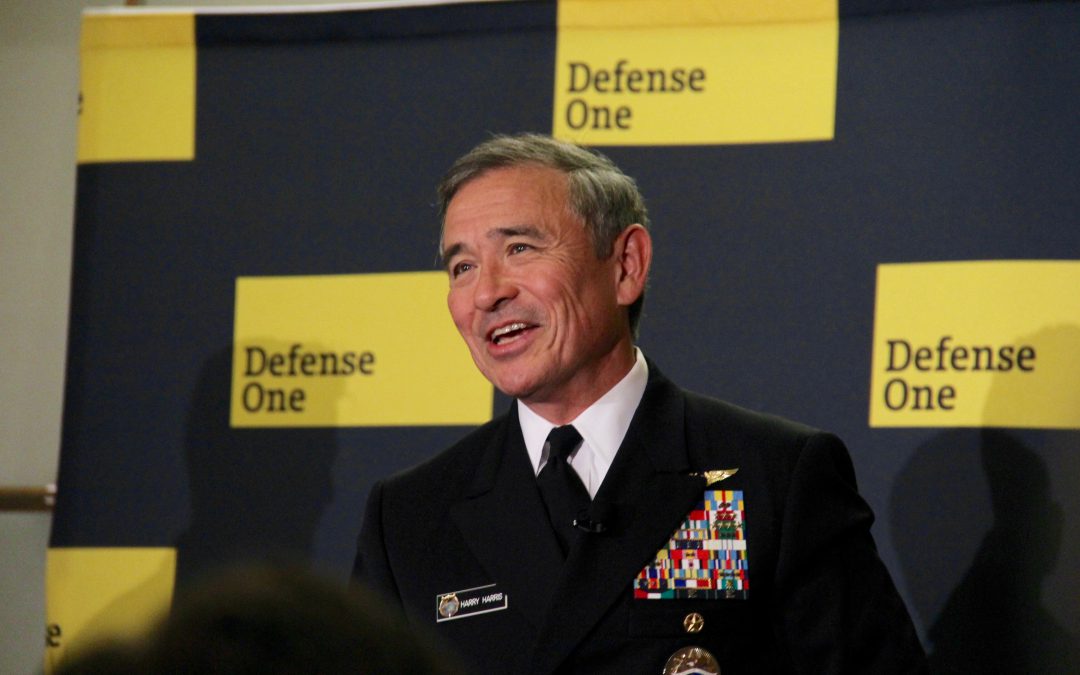WASHINGTON — There is “no doubt” that America’s presence in the Pacific and Asia will continue because of potential threats from North Korea, China and the Islamic State, the commander of U.S. military activities in the region said Tuesday.
Navy Adm. Harry B. Harris Jr., who heads U.S. Pacific Command, said the U.S. will continue to work with allies and partners going forward as “the security partner of choice” in the area.
“Since the end of World War II, U.S. military forces have had a persistent and robust presence throughout the region,” he said. “This won’t change, and no one should doubt our resolve to defend the territory of the United States, our people and our interests.”
Although traditionally Navy-centric, Pacific Command is a “multi-domain theater,” said Harris, who advocated for cross-domain capabilities, an emerging strategy that involves sophisticated coordination among air, land and sea units. The Army can play an increased role by using land-based missile systems to fire on maritime targets, he said.
In the past, the outspoken Harris has made clear his disapproval of China’s advances in the South China Sea, calling the country “provocative and expansionist” in an April speech in Malaysia. Although the U.S. is not among the countries, mainly Asian, that claim sovereignty over parts of the South China Sea, it has conducted freedom-of-navigation operations to combat excessive maritime claims.
He affirmed that policy Tuesday and cautioned against “Chinese aggressiveness” in the region. However, he said it was still important to maintain “middle-of-the-road” relationships when possible, citing U.S.-China cooperation in a military exercise this week.
“I think these relationships are positive,” Harris said. “We should try to cooperate where we can, but we have to be ready to confront if we must.”
Another emerging threat is the potential “for the cancer known as ISIS to spread to the region,” Harris said. The terrorist group’s recruits from the Pacific Command area of responsibility — a number he suggested could be in the thousands — will eventually return home, where they could be dangerous operatives, he said.
“They’ll come back radicalized and weaponized,” he said. “They’ll have the skill sets and all of that. That is a concern for us, and it is a concern for the countries involved.”
He also expressed concern over North Korea’s weapons and nuclear testing, and said his responsibility as military commander in the region is to prepare for worst-case scenarios.
Harris also provided an update on relationships with other major players in the region, praising South Korea and Japan for their trilateral cooperation with the United States.
A February report from the conservative American Enterprise Institute called on the next U.S. president “to work with both South Korea and Japan on jointly strengthening democracy, human rights, and civil society in the Asia-Pacific.”
He attempted to ease worries about Philippine President Rodrigo Duterte’s call for a separation from the U.S. in economic and military affairs. Harris said his relationship with the Philippine military remains positive, and the U.S. still has access to the five bases in the Philippines that the two countries agreed upon in March.
Harris, who was the military adviser to Hillary Clinton when she was secretary of state, said the military will remain loyal to whoever is the commander-in-chief. It is crucial that military operations continue as they have been during the presidential transition.
“It’s important to note that America never has a lame-duck commander-in-chief,” Harris said. “I continue to serve President (Barack) Obama until Jan. 20, at which point I’ll serve President (Donald) Trump.”


